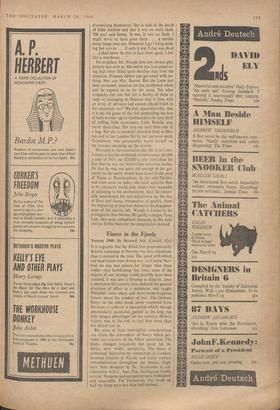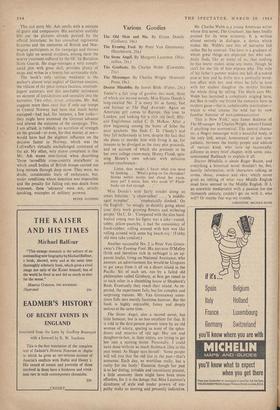Fiasco in the Fjords
Norway 1940. By Bernard Ash. (Cassell, 42s.)
IT is arguable that the Allied (but preponderantly British) campaign in Norway was less calamitous than it seemed at the time. The speed with which our land forces were driven out--in Central Nor- way no one was ashore for longer than three weeks—was humiliating; but, since none of the objects of our strategy could possibly have been attained, it was also a blessing in disguise, since it shortened the casualty lists, reduced the general diversion of effort to a minimum, and taught Whitehall some sharp and never-to-be-forgotten lessons about the conduct of war. The German Navy, on the other hand, never recovered from the losses it suffered in operations which, though spectacularly successful, gained in the long run only meagre advantages for our enemies. Hitler's victory was in the end to cost him more than our defeat cost us.
But none of these hindsighted considerations can dilute the atmosphere of fiasco which per- vades any account of the Allied operations. The plans, changed frequently but never for the better, were wildly unrealistic. The chain of command, bedevilled by committees in London, personal rivalries at Narvik and faulty wireless communications throughout the theatre, might have been designed by Dr. Strabismus in col- laboration with C. Suet, Esq. Intelligence hardly existed. Weapons and equipment were inadequate and unsuitable. The Territorials who made up half the force were less than half-trained.
This sad story Mr. Ash retells with a mixture of gusto and compassion. His, narrative usefully fills out the pictures already painted by the official historians; he has consulted regimental histories and the memories of British and Nor- wegian participants in the campaign and throws fresh light on several incidents, among them the scurvy treatment suffered by the OC 1st Battalion Scots Guards. He stage-manages a very compli- cated plot with great skill, provides plenty of maps and writes in a breezy but serviceable style.
The book's only serious weakness is the author's almost total neglect of German sources; the villains of the piece remain faceless, omnisub- jugant automata and this inevitably introduces an element of lopsidedness and unreality into the narrative. Two other, lesser, criticisms. Mr. Ash suggests more than once that if only our troops in Central Norway had been that much better equipped—had had, for instance, a few tanks— they might have stemmed the German advance and altered the outcome of the campaign. This, I am afraid, is rubbish; no accretion of strength on the ground—or even, for that matter, at sea— would have had the slightest influence on the decisive factor in Norway, which was the Luftwaffe's virtually unchallenged command of the air. My other, very minor complaint is that Mr. Ash waxes over-lyrical when describing `those incredible cross-country marathons' in which small bodies of British troops carried out long retreats through deep snow. They were, no doubt, considerable feats of endurance; but, under conditions where desertion was impossible and the penalty for falling out was death from exposure, these 'odysseys' were not, strictly speaking, examples of military prowess.
PETER FLEMING









































 Previous page
Previous page